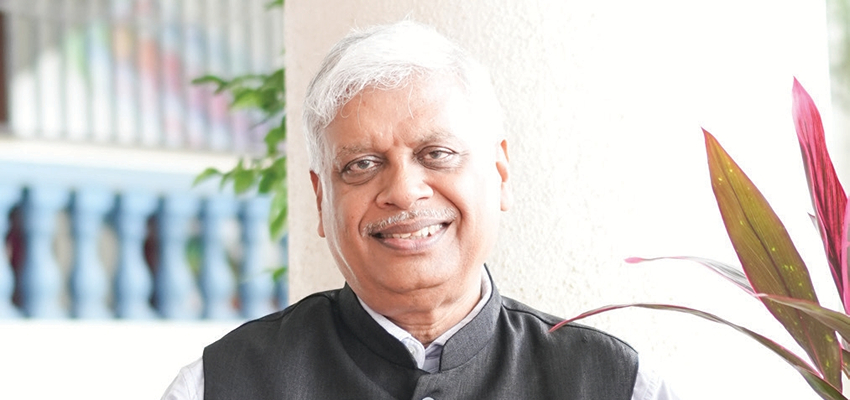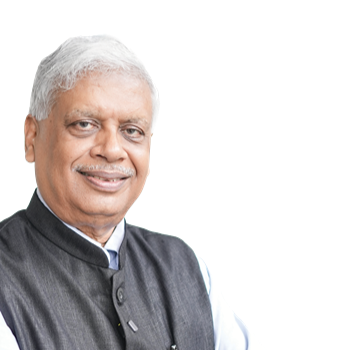Grooming Future Managers

In a global race of job opportunities how lucky are the MBA graduates in India? Corporate veteran, Yasho V. Verma talking recently at an MBA students programme, offered insight into leadership, emotional intelligence, and the realities of today’s corporate world. Management consultant and board member of various reputed organisations, Verma began his career as a Divisional Manager at Tata Steel, played a pivotal role as COO, LG India, and was CEO, Onida. We bring you key excerpts from the talk
As future corporate managers you all are lucky to be born in this country—India of today. India is one of the very few countries, which is growing rapidly and will create many job opportunities. India is often described as a "young" country due to its large youth population, and this trend is going to continue for the next 15 years. In most of the developed countries the median age of the population is increasing, and the workforce is aging. Whatever President Donald Trump may say or do, Indians will have to go there and fill the workforce gaps. So, you will always have global opportunities to build your career.
Handling diversity

Being born in a diverse society like India, which you may not realise right now, taking the role of global executive today means understanding, appreciating, and handling diversity. You all here are familiar with the defining characteristics of diversity, but it needs to be further developed.
I worked in many companies, one of them was LG, a South Korean company. The way they (Korean society) evolved over centuries under rule of Japan and China—being very small in size, they survived by clinging together to their values; when the time of globalisation came it took them sometime to globalise, because of the habit they developed to survive, had to reverse.
It’s your parents' dream to see you succeed
You are truly fortunate, not only because of the education you’re receiving, but because you have parents who are giving up their own dreams and passions, just to see you succeed.
I recall a conversation I had about 12 years ago with two professors from Harvard University. We were discussing about our children, when one of them asked, “Who decides which stream your child should choose?”. I responded, “Together— my wife, children and I.” They were surprised. “In our country, it’s solely the child who chooses their stream,” one said. Then the second professor asked, “Who pays the course fees?”. I replied, “We do.” He said, “That’s why you have the power to negotiate the decision of choosing their career options.” That one comment struck me deeply—showed how surprising it was for them to know, how parents in India have a role in making academic choices of their children.
In India, relationships are rooted in emotions. Whether it’s your family or larger social circle, these bonds are built on care and sensitivity. The support system around you, woven from emotional connections, gives you an advantage that many don’t have, which is why you are lucky.
Experimentation, reflection and transformation
Students must understand that these two years of education are absolutely vital. This is the time to work on yourself. You are in a phase where learning, failing and improving, don’t come with heavy consequences—it’s your training ground. Once you step into the professional world, every action will be evaluated. These are your golden years meant for experimentation, reflection and transformation. You are surrounded by mentors who guide you, not evaluators who judge you.
A common misconception is that an MBA programme automatically prepares you for the corporate world, however the real test begins after graduation and that’s when the reality hits, which often shocks the new graduates. It’s here that your parents play a crucial role. Their preparation, advice and emotional support, helps you navigate those early years. Even your elder siblings, through their shared experiences, become part of that support system. These emotional anchors are not just comforting, but they’re essential.
"When you’re handed a difficult task, don’t run away from it—accept it. If you accept it mentally, you're already halfway through. The human mind is incredibly powerful. Believe in your own ability to adapt and learn"
-Yasho V. Verma
Performance, excellence and uniqueness

As I stepped into retirement, I did so with a sense of contentment. The world today is rapidly evolving, and it’s far more competitive than when I started. Technologies emerge faster than ever, and adapting has become a full-time task. It’s no Longer just business—it’s a battlefield. Either you survive and grow, or you risk being left behind. Performance, excellence and uniqueness makes you stand out differently.
Around 90 per cent of companies shut down within 25 years. Most fail because they resist change—they don’t adapt to the market or to new consumer behaviours, and the cost of that resistance is halting. Flexibility and openness to transformation are essential in both business and life.
How do you become workforce-ready?
As you prepare to enter the workforce, you’ll face many challenges, but one of the biggest will be internal: personality change. How do you become workforce-ready? Through emotional sensitivity and stability; these are your strongest tools. As a parent, I admit that we’ve pampered our children. But, the world outside is harsh. For an instance, the newly joined employee is criticised by their boss for underperforming. Many young professionals are taken aback — “How can he say that? Even my parents never spoke to me this way.” This emotional fragility can cost careers. It is why so many young talents burn out or step out of the company.
Attitude is everything
What you learn today must be carried with you tomorrow—keep learning. Around 80 per cent of IITs and IIMs alumni experience mid-life crises between the age of 40 to 50, because they often lack emotional stability. In the workplace, some become argumentative, unable to adapt or collaborate; that attitude needs to evolve. Amartya Sen’s book ‘The Argumentative Indian’ shows a mirror to our temperament and its worth reflecting on. As an MBA student, learn to follow through on tasks, with commitment and emotional stability. Global expectations won’t wait for your growth to catch up.
Over the course of my career, I’ve worked closely with professionals from Japan and South Korea. The difference in efficiency and work ethics is something to learn from. Indian students must rise to meet the global benchmark. It won’t be easy, but it’s not impossible.
Another major hurdle for Indian professionals is lack of focus. We tend to involve ourselves in what the person next to us is doing, losing sight of our own responsibilities. This dilutes clarity and weakens performance. Focus is not just a skill it’s discipline.
Finally, when you’re handed a difficult task, don’t run away from it—accept it. If you accept it mentally, you're already halfway through. The human mind is incredibly powerful. Believe in your own ability to adapt and learn. Invest in yourself to grow in your career, as sky is the limit.
AI can only be supportive
Yasho V. Verma speaks to Corporate Citizen on the evolving role of human resources and what the future holds for aspiring professionals
Corporate Citizen: From labour unrest to AI disruption, what's the biggest challenge HR is facing today?
Yasho V. Verma: The way corporate companies have grown over the years, labour unrest is now only sporadic, maybe in one or two cases, not more than that. It's no longer a major issue because management has evolved and now understands that to achieve higher productivity from labour, we must keep motivating them. Besides that, one big word emerging these days is Artificial Intelligence (AI). I'm slightly aware of the tools currently available, and given the present situation, AI is only going to be supportive to human beings, because it is based on logic. But, a human being working in an organisation doesn’t operate only on logic, they have feelings, emotions, passion and spirit. It’s much more complicated than any AI tool that has been developed. Maybe in the coming 10 or 20 years, who knows what might happen.
CC: Do you think it'll take longer to make that switch from humans to AI technology?
AI should work more on emotions and feelings, but whether it can be developed that way or not, I doubt. The switch will take a long time, it seems.
CC: Do you think AI can replace HR management?
No, it can only be supportive, it cannot completely replace HR management. It can only enhance the system, improve efficiency and productivity, but human beings will continue to work and there won’t be any replacement as such.
CC: Your career has spanned decades. What's the one mantra that kept you going?
Don't give up. Try your best and go into the details when you deliver to get better clarity and depth in the work you do.
CC: You've experienced both Indian and global corporate cultures. What makes Indian business techniques or leadership unique from global business?
Indian organisational culture is different from organisations in other countries, but to truly compete in the global market, the standards of performance can’t be based only on Indian methodology, they must be globally benchmarked. Handling Indians in India is a different ball game. Interestingly, the same people behave very differently outside India.
CC: How can aspiring students develop in terms of an HR mindset, creativity and the urge to grow? What should motivate them?
The present generation has a lot of strengths, but the weakness I see, is in emotional stability. Whether in HR, business or any other field, emotional stability is very important. Unless you're emotionally stable, you cannot manage people in an organisation. And, as students they need to learn these practices as well.
A stable mindset comes from childhood itself. It is said that the core personality develops from the time you're born until the age of five. Parents play a very important role in shaping a stable mindset in the child. The key is the willingness to absorb, learn, and not react to every situation that helps a person achieve a stable mindset to focus on work.
CC: You were at the forefront of LG's journey and have also written a book based on it. What should the coming generation inculcate to get into HR, and what qualities should they develop?
Firstly, as newer tools are emerging and more advancements are being seen, it is complicating tasks for humans. Secondly, business is becoming extremely competitive, and only the best can survive. The market has evolved in such a way that there's no scope for lethargy. It is the quality of the management that can determine how well they can motivate and get the best out of the employees, whether they are working for mid-term, long-term or short-term goals.
CC: Do you think today's MBAs are job-ready? What are they missing when they step into the corporate world?
Once the students join an organisation, they experience a strong work culture shock. During their college days, they have not experienced a major shift, where they are treated as the lowest level in the hierarchy. I still remember, when I joined Tata Steel Group, J.R.D. Tata in his very first lecture said a very bold statement “Whatever you’ve learnt in your MBA, forget it! Start learning now. You’ll need those MBA concepts later, but at the beginning, you need to start afresh”. And, that’s how I began my journey.